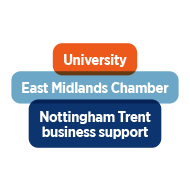Cities of Innovation: Nottingham
Key indicators
ICT Infrastructure

Network

Full fibre length (Kms)
— 70km of full fibre across the city providing internet speeds 60 times faster than the average UK broadband download speed, benefitting more than 3.000 businesses — 5G technology in 2019
Local, national and international transport links

Train journey to London

Flight destinations (East Midlands airport 4.9 million passengers)
— UK’s busiest pure cargo airport, handling 359,000 tonnes of cargo last year — UK’s second largest cargo airport — 30 daily trains to London
University links and access to talent

Universities

QS World University ranking (Nottingham Trent University)
— Nottingham Trent University was ranked 601-800th University in 2017 by Times Higher Education — 2 universities with 60,000 students — Centres of excellence in areas such as aerospace, cancer research, Industry 4.0, data analytics
Costs and availability of workspace

Co-working spaces
City support for start-ups and SMEs

Accelerators

Partnership
— Big House Accelerator–for businesses which want to start-up, grow or establish a business in Nottinghamshire or Derbyshire — D2N2 Growth Hub Scale-up Service–partnership between Nottingham Trent business support, University and East Midlands Chamber
Financial support and access to investors & accelerators

Accelerators

SMEs support
— The Foresight Nottingham Fund: €39 million dedicated to the support of SMEs in the UK — Local investors: Midlands Engine Investment Fund (MEIF) and Blenheim Chalcot
Additional information
ICT Infrastructure
With gigabit speed internet services available, Nottingham is a ‘Gigabit City’, and consequently the productivity of the 22,129 digital tech workers is enhanced.
Local, national and international transport links
East Midlands Airport’s annual direct economic contribution to the East Midlands is £300m which is up 15% on the previous year. Its indirect contribution is far higher as the airport generates spending in the region.
Local transport includes trams, bio buses, pay-per-hour car clubs and Citycard Cycles, which is a 24 hour on street bike hire service.
University links and access to talent
The universities cover disciplines from medicine, law, architecture, and computer science to Nottingham Trent’s specialist creative industry institute Confetti, with the very best technology, studios and equipment, and industry connected tutors.
University centres of excellence include: aerospace, cancer research, Industry 4.0, data analytics and food science. There are many mechanisms for university / business co-operation, including collaborative research, sponsored research, student placements, graduate recruitment and executive education amongst others.
Nottingham’s leading industries are: financial and business services, creative and digital, life sciences and advanced manufacturing. More than 60% of the jobs in Nottingham are in knowledge intensive industries, well above the UK average and 32% of Nottingham’s population hold a degree-level qualification.
Costs and availability of workspace
City support for start-ups and SMEs
Big House Accelerator offers workshops and networking events, grants, and graduate placements.
Hub D2N2 Growth Scale-up Service provides specific, tailored assistance in scaling up for businesses that fulfill certain criteria.
Financial support and access to investors & accelerators
The Foresight Nottingham Fund. Foresight, on behalf of the Fund, is seeking to make investments between £100,000 and £2 million into eligible businesses in the Nottinghamshire region to support the growth plans and business opportunities
Local investors
MEIF (Midlands Engine Investment Fund) – commercially focused finance through Small Business Loans, Debt Finance, Proof of concept and Equity Finance funds.
Blenheim Chalcot – Venture Builders, not Venture Capitalists, who don’t only invest funds, but also invest knowledge and experience, ideas and infrastructure.
Accelerators
BioCity Accelerator programme offers £100k to accelerate start-ups. Businesses do not have to pay for the programme, nor give up shares or equity or even a board seat.
Invest to Grow is run by the University of Derby, and it provides grants and loans of between £15,000 and £250,000 to support private-sector businesses across the East Midlands to innovate, grow and create jobs.
How to set up a business: a quickfire guide
What are my options?
While there are numerous business forms, the most common initial start-up structures are as a sole trader and or a private company limited by shares.
A sole trader is the simplest structure as the individual does not need to register the company with a formal constitution. Sole traders enjoy minimal paperwork and benefit from the flexibility of moulding their business plan without consulting shareholders. The downfall of this structure is that sole traders are personally liable for all the debts and contractual obligations of the business.
Private companies limited by shares give a business its own legal personality. This means that the business owners are not personally liable for the company’s debts. Companies with this structure are also able to raise capital more easily due to tax incentives and greater credibility as a result of a company’s professional image. Although this structure comes with additional paperwork, the UK’s efficient online company system has made the submission of paperwork a relatively simply task.
What do I need to set up a company?
To incorporate a company, an individual needs to submit the following:
Company name: this must not be too similar to another registered name.
Registered address: you must provide a UK office address as the address to which all business letters and invoices are sent. While there needs to be a registered address in the UK, an international director does not need to be present at the address. The director only needs to ensure that it is a physical address from where they can receive mail. Many businesses use their accountant’s address where post can then be forwarded to the director or managed by the accountant itself.
Director: the name of at least one director. Directors need to be at least 16 years old. Directors do not need to reside in or even have visited the UK. Shares: the details of share capital with at least one initial shareholder.
Company documents: a Memorandum and Articles of Association are the legal documents which confirm company formation and dictate the rules by which the company will be run. While these may seem daunting, the UK government’s website (gov.uk) has a memorandum template and model articles which a director may copy and complete easily and quickly for submission.
How much does it cost?
The entire online registration process costs £12 (€14) and it takes up to 24 hours for the company to be registered.
Tax rates
Following registration, the company will be subject to a 19% tax rate on company profits. Additionally, the company may be liable to pay VAT if its taxable turnover exceeds £85,000 annually. VAT rates vary depending on services or goods rendered with the maximum VAT rate being 20%.
The UK government strongly supports start-ups and offers various tax relief and support schemes. Tax relief is usually possible on spending that is entirely for business use such as certain business travel or machinery. R&D tax credits are available to businesses which are working to advance science or technology. A company that profits from its patented invention could also benefit from Patent Box in which corporation tax is lowered from 19% to 10%.
Small businesses can also benefit from the Seed Enterprise Investment Scheme which offers both income and capital gains tax relief to the company’s investors.
To raise further capital, the government arm Innovate UK drives growth by supporting UK- based businesses through funding. To date, the scheme has invested around £2.5 billion. Businesses may participate through regular innovation competitions, which focus on different sectors.
Legal contact
Electra Japonas and Kaveesha Thayalan
The Law Boutique
Work.Life, The Law Boutique, 5 Tanner St, Bermondsey, London SE1 3LE


